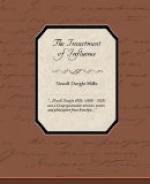In similar vein we remember the English-speaking world has recently been celebrating the anniversary of the birth of Keats, who is the only pure Greek in all English literature, for whose imagination “a thing of beauty was a joy forever,” and whose genius in divining the secrets of the beautiful amounted to inspiration. We know now that no poet in all time, who died so young, has left so much that is precious. Scholars are not wanting who believe that had he lived to see his maturity Keats would have ranked with the five great poets of the first order of genius. Yet the publication of his volume of verse received from “Blackwood” and the “Quarterly” only contempt and bitter scorn. Waxing bold, the penny-a-liners grew savage, until the very skies rained lies and bitter slanders upon poor Keats. Sensitive, soon he was wounded to death. After a week of sleeplessness, he arose one morning to find a bright red spot upon his handkerchief. “That is arterial blood,” said he; “that drop is my death-warrant; I shall die.” And so, when he was one-and-twenty, friends lifted above the boy’s dust a marble slab, upon which was written: “Here lies one whose name was writ in water.” Now his name shines like a star, while low down and bespattered with mud are the names of those whose cruel criticisms helped to kill the boy and whose only claim to immortality is their brutality.
Witness also the contempt our age once visited upon Browning, whose mind is slowly becoming recognized as one of the rich-gold minds of our century. Witness the sport over Ruskin’s “Munera Pulveris,” and the scornful reception given Carlyle’s “Sartor Resartus.” Now that a few years have passed, those who once reviled are teaching their children the pathway to the graves of the great. The harshness of the world’s treatment of its greatest teachers makes one of the most pathetic chapters in history. God gives each nation only a few men of supreme talent. Gives it, for greatness is not made; it is found as is the gold. Gold cannot be made out of mud; it is uncovered. And God gives each generation a few men of the first order; and when they have created truth and beauty they have the right while they live




